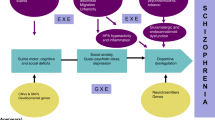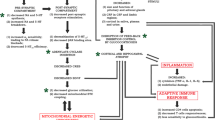Abstract
Background
Several studies have evaluated the possible association between polymorphisms or variants in Corticotropin-releasing hormone 1 receptor gene (CRHR1) with depression; however, results remain contradictory and heterogeneous.
Objective
To our knowledge, we conducted the first comprehensive systematic review and meta-analysis evaluating the association of the CRHR1 gene and the risk of depression.
Methods
A search online was conducted in databases for any CRHR1 genetic association studies in depression. Data were extracted for evaluation of pooled estimates using meta-analytic techniques. Statistical analyses were performed using the Comprehensive Meta-analysis, v2.0 software.
Result
A total of 1403 cases and 2353 mentally healthy controls were included in this study. We found a significant association of rs242941, rs1876828 and rs242939 variants of the CRHR1 gene with depression. No association of CRHR1 rs110402 and depression was observed.
Conclusion
Our meta-analysis shows that some variants of the CRHR1 gene (rs242941, rs1876828 and rs242939) might confer susceptibility to depression. Further studies with larger sample sizes need to be conducted.




Similar content being viewed by others
References
Aguilera G, Rabadan-Diehl C, Nikodemova M (2001) Regulation of pituitary corticotropin releasing hormone receptors. Peptides 22:769–774
Aguilera G, Nikodemova M, Wynn PC, Catt KJ (2004) Corticotropin releasing hormone receptors: two decades later. Peptides 25:319–329
Dautzenberg FM, Kilpatrick GJ, Hauger RL, Moreau J (2001) Molecular biology of the CRH receptors—in the mood. Peptides 22:753–760
DerSimonian R (1996) Meta-analysis in the design and monitoring of clinical trials. Stat Med 15:1237–1248 (discussion 1249–1252)
Egger M, Davey Smith G, Schneider M, Minder C (1997) Bias in meta-analysis detected by a simple, graphical test. BMJ 315:629–634
Higgins JP, Thompson SG (2002) Quantifying heterogeneity in a meta-analysis. Stat Med 21:1539–1558
Holsboer F (2000) The corticosteroid receptor hypothesis of depression. Neuropsychopharmacology 23:477–501
Ishitobi Y, Nakayama S, Yamaguchi K, Kanehisa M, Higuma H, Maruyama Y, Ninomiya T, Okamoto S, Tanaka Y, Tsuru J et al (2012) Association of CRHR1 and CRHR2 with major depressive disorder and panic disorder in a Japanese population. Am J Med Genet B Neuropsychiatr Genet 159B:429–436
Kessler RC, Berglund P, Demler O, Jin R, Koretz D, Merikangas KR, Rush AJ, Walters EE, Wang PS (2003) The epidemiology of major depressive disorder: results from the National Comorbidity Survey Replication (NCS-R). JAMA 289:3095–3105
Kim EJ, Pellman B, Kim JJ (2015) Stress effects on the hippocampus: a critical review. Learn Mem 22:411–416
Kohli MA, Lucae S, Saemann PG, Schmidt MV, Demirkan A, Hek K, Czamara D, Alexander M, Salyakina D, Ripke S et al (2011) The neuronal transporter gene SLC6A15 confers risk to major depression. Neuron 70:252–265
Leszczynska-Rodziewicz A, Szczepankiewicz A, Dmitrzak-Weglarz M, Rajewska-Rager A, Skibinska M, Hauser J (2013) No association between polymorphisms and haplotypes of the AVPR1b, CRHR1 and NR3C1 genes and depression with melancholic features in the course of bipolar disorder. Psychiatry Res 207:140–142
Lewis CM, Ng MY, Butler AW, Cohen-Woods S, Uher R, Pirlo K, Weale ME, Schosser A, Paredes UM, Rivera M et al (2010) Genome-wide association study of major recurrent depression in the U.K. population. Am J Psychiatry 167:949–957
Lewis G, Collishaw S, Harold G, Rice F, Thapar A (2012) Maternal depression and child and adolescent depression symptoms: an exploratory test for moderation by CRHR1, FKBP5 and NR3C1 gene variants. Behav Genet 42:121–132
Licinio J, O’Kirwan F, Irizarry K, Merriman B, Thakur S, Jepson R, Lake S, Tantisira KG, Weiss ST, Wong ML (2004) Association of a corticotropin-releasing hormone receptor 1 haplotype and antidepressant treatment response in Mexican-Americans. Mol Psychiatry 9:1075–1082
Liu Z, Zhu F, Wang G, Xiao Z, Wang H, Tang J, Wang X, Qiu D, Liu W, Cao Z et al (2006) Association of corticotropin-releasing hormone receptor1 gene SNP and haplotype with major depression. Neurosci Lett 404:358–362
Liu Z, Liu W, Yao L, Yang C, Xiao L, Wan Q, Gao K, Wang H, Zhu F, Wang G et al (2013) Negative life events and corticotropin-releasing-hormone receptor1 gene in recurrent major depressive disorder. Sci Rep 3:1548
Maniam J, Antoniadis C, Morris MJ (2014) Early-life stress, HPA axis adaptation, and mechanisms contributing to later health outcomes. Front Endocrinol (lausanne) 5:73
Moher D, Liberati A, Tetzlaff J, Altman DG (2009) Preferred reporting items for systematic reviews and meta-analyses: the PRISMA statement. PLoS Med 6:e1000097
Muglia P, Tozzi F, Galwey NW, Francks C, Upmanyu R, Kong XQ, Antoniades A, Domenici E, Perry J, Rothen S et al (2010) Genome-wide association study of recurrent major depressive disorder in two European case-control cohorts. Mol Psychiatry 15:589–601
Papiol S, Arias B, Gastó C, Gutiérrez B, Catalán R, Fañanás L (2007) Genetic variability at HPA axis in major depression and clinical response to antidepressant treatment. J Affect Disord 104:83–90
Plotsky PM (1991) Pathways to the secretion of adrenocorticotropin: a view from the portal*. J Neuroendocrinol 3:1–9
Pompili M, Serafini G, Innamorati M, Moller-Leimkuhler AM, Giupponi G, Girardi P, Tatarelli R, Lester D (2010) The hypothalamic-pituitary-adrenal axis and serotonin abnormalities: a selective overview for the implications of suicide prevention. Eur Arch Psychiatry Clin Neurosci 260:583–600
Rajeevan H, Osier MV, Cheung KH, Deng H, Druskin L, Heinzen R, Kidd JR, Stein S, Pakstis AJ, Tosches NP et al (2003) ALFRED: the ALelle FREquency database. Update Nucleic Acids Res 31:270–271
Ray LA, Sehl M, Bujarski S, Hutchison K, Blaine S, Enoch MA (2013) The CRHR1 gene, trauma exposure, and alcoholism risk: a test of G x E effects. Genes Brain Behav 12:361–369
Rietschel M, Mattheisen M, Frank J, Treutlein J, Degenhardt F, Breuer R, Steffens M, Mier D, Esslinger C, Walter H et al (2010) Genome-wide association-, replication-, and neuroimaging study implicates HOMER1 in the etiology of major depression. Biol Psychiatry 68:578–585
Ripke S, Wray NR, Lewis CM, Hamilton SP, Weissman MM, Breen G, Byrne EM, Blackwood DH, Boomsma DI, Cichon S et al (2013) A mega-analysis of genome-wide association studies for major depressive disorder. Mol Psychiatry 18:497–511
Rivera M, McGuffin P (2015) The successful search for genetic loci associated with depression. Genome Med 7:92
Sakai K, Yamada M, Horiba N, Wakui M, Demura H, Suda T (1998) The genomic organization of the human corticotropin-releasing factor type-1 receptor. Gene 219:125–130
Shi J, Potash JB, Knowles JA, Weissman MM, Coryell W, Scheftner WA, Lawson WB, DePaulo JR Jr, Gejman PV, Sanders AR et al (2011) Genome-wide association study of recurrent early-onset major depressive disorder. Mol Psychiatry 16:193–201
Shyn SI, Shi J, Kraft JB, Potash JB, Knowles JA, Weissman MM, Garriock HA, Yokoyama JS, McGrath PJ, Peters EJ et al (2011) Novel loci for major depression identified by genome-wide association study of Sequenced Treatment Alternatives to Relieve Depression and meta-analysis of three studies. Mol Psychiatry 16:202–215
Smith DJ, Escott-Price V, Davies G, Bailey ME, Colodro-Conde L, Ward J, Vedernikov A, Marioni R, Cullen B, Lyall D et al (2016) Genome-wide analysis of over 106 000 individuals identifies 9 neuroticism-associated loci. Mol Psychiatry 21:749–757
Stang A (2010) Critical evaluation of the Newcastle-Ottawa scale for the assessment of the quality of nonrandomized studies in meta-analyses. Eur J Epidemiol 25:603–605
Steckler T, Dautzenberg FM (2006) Corticotropin-releasing factor receptor antagonists in affective disorders and drug dependence—an update. CNS Neurol Disord Drug Targets 5:147–165
Stephens MA, Wand G (2012) Stress and the HPA axis: role of glucocorticoids in alcohol dependence. Alcohol Res 34:468–483
Sudmant PH, Rausch T, Gardner EJ, Handsaker RE, Abyzov A, Huddleston J, Zhang Y, Ye K, Jun G, Fritz MH et al (2015) An integrated map of structural variation in 2,504 human genomes. Nature 526:75–81
Tan EC, Chua TE, Lee TM, Tan HS, Ting JL, Chen HY (2015) Case-control study of glucocorticoid receptor and corticotrophin-releasing hormone receptor gene variants and risk of perinatal depression. BMC Pregnancy Childbirth 15:283
Tsatsanis C, Dermitzaki E, Venihaki M, Chatzaki E, Minas V, Gravanis A, Margioris AN (2007) The corticotropin-releasing factor (CRF) family of peptides as local modulators of adrenal function. Cell Mol Life Sci 64:1638–1655
Velders FP, Kuningas M, Kumari M, Dekker MJ, Uitterlinden AG, Kirschbaum C, Hek K, Hofman A, Verhulst FC, Kivimaki M et al (2011) Genetics of cortisol secretion and depressive symptoms: a candidate gene and genome wide association approach. Psychoneuroendocrinology 36:1053–1061
Waszczuk MA, Zavos HM, Gregory AM, Eley TC (2014) The phenotypic and genetic structure of depression and anxiety disorder symptoms in childhood, adolescence, and young adulthood. JAMA Psychiat 71:905–916
Welch V, Petticrew M, Petkovic J, Moher D, Waters E, White H, Tugwell P (2016) Extending the PRISMA statement to equity-focused systematic reviews (PRISMA-E 2012): explanation and elaboration. J Clin Epidemiol 70:68–89
Xiao Z, Liu W, Gao K, Wan Q, Yang C, Wang H, Wang X, Wang G, Liu Z (2011) Interaction between CRHR1 and BDNF genes increases the risk of recurrent major depressive disorder in Chinese population. PLoS ONE 6:e28733
Zhou H, Cheng Z, Bass N, Krystal JH, Farrer LA, Kranzler HR (2018) Genome-wide association study identifies glutamate ionotropic receptor GRIA4 as a risk gene for comorbid nicotine dependence and major depression. Transl Psychiatry 8:208
Acknowledgements
The authors thank all those who collaborated in the analysis, interpretation of data and writing the article.
Funding
None.
Author information
Authors and Affiliations
Corresponding authors
Ethics declarations
Conflict of interest
The authors report no conflicts of interest. The authors alone are responsible for the content and writing of the paper.
Additional information
Publisher's Note
Springer Nature remains neutral with regard to jurisdictional claims in published maps and institutional affiliations.
Rights and permissions
About this article
Cite this article
Hernández-Díaz, Y., González-Castro, T.B., Juárez-Rojop, I.E. et al. The role of rs242941, rs1876828, rs242939 and rs110402 polymorphisms of CRHR1 gene and the depression: systematic review and meta-analysis. Genes Genom 43, 1339–1349 (2021). https://doi.org/10.1007/s13258-021-01133-9
Received:
Accepted:
Published:
Issue Date:
DOI: https://doi.org/10.1007/s13258-021-01133-9




